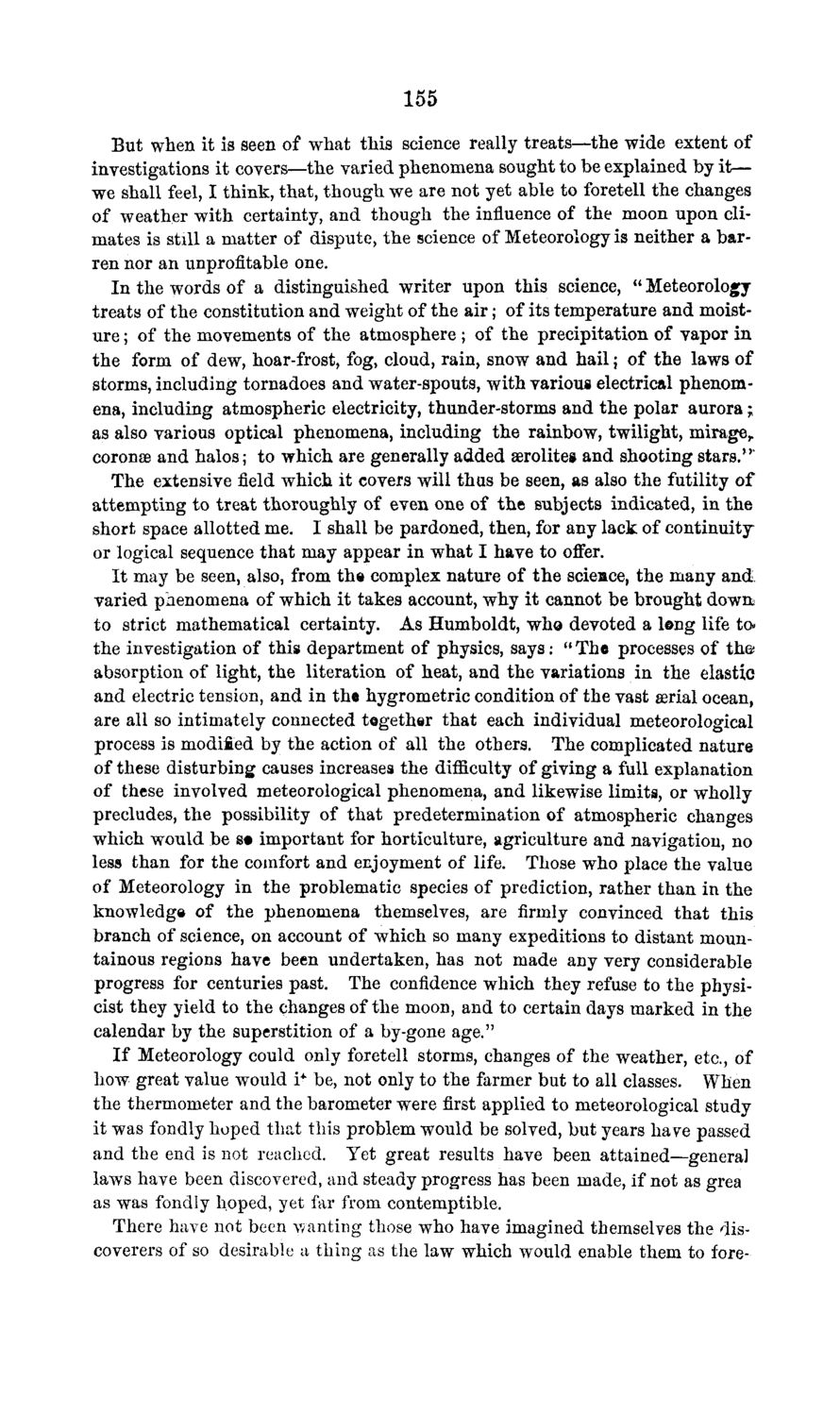| |
| |
Caption: Board of Trustees Minutes - 1869
This is a reduced-resolution page image for fast online browsing.

EXTRACTED TEXT FROM PAGE:
155 But when it is seen of what this science really treats—the wide extent of investigations it covers—the varied phenomena sought to be explained by it— we shall feel, I think, that, though we are not yet able to foretell the changes of weather with certainty, and though the influence of the moon upon climates is still a matter of dispute, the science of Meteorology is neither a barren nor an unprofitable one. In the words of a distinguished writer upon this science, " Meteorology treats of the constitution and weight of the air; of its temperature and moisture ; of the movements of the atmosphere ; of the precipitation of vapor in the form of dew, hoar-frost, fog, cloud, rain, snow and hail; of the laws of storms, including tornadoes and water-spouts, with various electrical phenomena, including atmospheric electricity, thunder-storms and the polar aurora; as also various optical phenomena, including the rainbow, twilight, mirage,, coronas and halos; to which are generally added aerolites and shooting stars."* The extensive field which it covers will thus be seen, as also the futility of attempting to treat thoroughly of even one of the subjects indicated, in the short space allotted me. I shall be pardoned, then, for any lack of continuity or logical sequence that may appear in what I have to offer. It may be seen, also, from the complex nature of the scieace, the many and varied phenomena of which it takes account, why it cannot be brought downs to strict mathematical certainty. As Humboldt, who devoted a l©ng life to* the investigation of this department of physics, says: "The processes of the; absorption of light, the literation of heat, and the variations in the elastic and electric tension, and in the hygrometric condition of the vast aerial ocean, are all so intimately connected together that each individual meteorological process is modified by the action of all the others. The complicated nature of these disturbing causes increases the difficulty of giving a full explanation of these involved meteorological phenomena, and likewise limits, or wholly precludes, the possibility of that predetermination of atmospheric changes which would be se important for horticulture, agriculture and navigation, no less than for the comfort and enjoyment of life. Those who place the value of Meteorology in the problematic species of prediction, rather than in the knowledge of the phenomena themselves, are firmly convinced that this branch of science, on account of which so many expeditions to distant mountainous regions have been undertaken, has not made any very considerable progress for centuries past. The confidence which they refuse to the physicist they yield to the changes of the moon, and to certain days marked in the calendar by the superstition of a by-gone age." If Meteorology could only foretell storms, changes of the weather, etc., of how great value would i* be, not only to the farmer but to all classes. When the thermometer and the barometer were first applied to meteorological study it was fondly hoped that this problem would be solved, but years have passed and the end is not reached. Yet great results have been attained—general laws have been discovered, and steady progress has been made, if not as grea as was fondly hoped, yet far from contemptible. There have not been wanting those who have imagined themselves the discoverers of so desirable a thing as the law which would enable them to fore-
| |